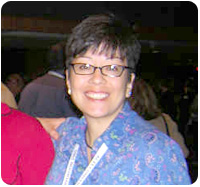Faculty support
Successful collaborations
Ecampus partners with 11 OSU academic colleges and 1,300+ faculty members each year.
Faculty Profiles
Deborah Rubel
 Program Leader
Program Leader
Ph.D. with a Major in Counseling
How long have you been involved with the OSU Ph.D. with a Major in Counseling?
I've taught in the Ph.D. program since Fall 2002 when I started as an assistant professor of counseling at OSU. I began mentoring my first doctoral students informally that first year and in the Fall of 2003, I became chair of my first doctoral committee. My first doctoral student finished her dissertation in February 2006 and graduated in June 2006.
What made you become interested in wanting to offer the program through Ecampus?
Ecampus became of great interest to me as I observed increasing numbers of fully-employed professionals wanting to complete a Ph.D. in counseling. Many of these students did enroll part time or would attempt to go full time in residence in Corvallis, but these paths were often very difficult. I think the use of the hybrid (online assignments/face-to-face instruction) model will open up a lot of opportunities for students who would otherwise forego a Ph.D.
What do you see as the advantages of this combination online/face-to-face course program?
With student time being so precious in our current climate, I have often wondered about the value of using face-to-face time for teaching tasks that could potentially be completed just as well online. In our profession, however, face-to-face interaction is essential to becoming an effective counselor educator, supervisor or advanced practitioner. Direct supervision, role-playing, group work and other experiential activities are critical to the experience of becoming a excellent practitioner, teacher or supervisor who is responsive to issues of culture and social justice. The hybrid model meets both these needs: it adds flexibility for students who are working in the field and it allows substantial face-to-face time for students to experience life-changing interaction.
Why do you feel it is important to support online learning by being and instructor for the Ph.D. with a Major in Counseling?
The online component allows our students to have the flexibility to maintain lives, families and jobs while completing what may be a huge dream for them.
What has been the biggest surprise to you about online learning?
When I've worked online with students that I've also had in 'live' classes, I'm always amazed at what I learn about them and from them that I don't get while 'in class.' There is a different level of connection that comes from online classes. Of course there are always students that I connect to in person, but often there are students who don't have that opportunity in class, either due to communication style, lack of time, etc. that I do end up connecting with online.
What's one thing about yourself you'd like students to know?
I'm always looking for ways to make their learning experiences better. My assumption is always that there are still areas to grow and new material to cover, so I'm always looking for that.
What do you enjoy about teaching, advising and guiding those who are expanding their career in counseling?
They are the best people around! Counselors and counselors-in-training are almost unamimously 'people people' so they are fun to talk to, are interested in forming genuine relationships, fascinated with other people and concerned about the social issues that affect people's lives. This makes mentoring, teaching and supervising in this program an absolute joy.
What would you tell a student who was interested in the program?
I would tell them that it is a life-changing experience. My assumption is that many people pursue degrees in counseling with an interest in self-growth and self-awareness, and that they are up for an adventure, one that they will share with others. This program offers that and more for those that are truly willling to engage in it.
Get more info about our online/face-to-face hybrid Ph.D. with a Major in Counseling.
Back to Faculty Profiles.
Features and Navigation
Academic calendar
Currently it's winter term. See academic calendar for our quarter term schedule.
Spring term starts March 30.
Summer term starts June 22.

